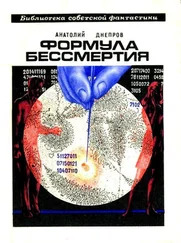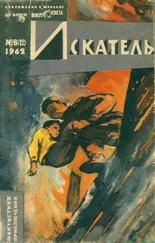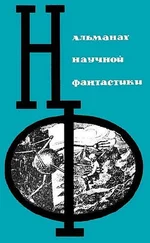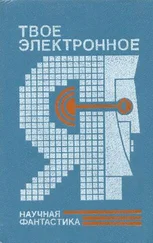Анатолий Днепров - Crabs on the island
Здесь есть возможность читать онлайн «Анатолий Днепров - Crabs on the island» весь текст электронной книги совершенно бесплатно (целиком полную версию без сокращений). В некоторых случаях можно слушать аудио, скачать через торрент в формате fb2 и присутствует краткое содержание. Город: Moscow, Год выпуска: 1968, Издательство: MIR Publishers, Жанр: Фантастика и фэнтези, на английском языке. Описание произведения, (предисловие) а так же отзывы посетителей доступны на портале библиотеки ЛибКат.
- Название:Crabs on the island
- Автор:
- Издательство:MIR Publishers
- Жанр:
- Год:1968
- Город:Moscow
- ISBN:нет данных
- Рейтинг книги:4 / 5. Голосов: 1
-
Избранное:Добавить в избранное
- Отзывы:
-
Ваша оценка:
- 80
- 1
- 2
- 3
- 4
- 5
Crabs on the island: краткое содержание, описание и аннотация
Предлагаем к чтению аннотацию, описание, краткое содержание или предисловие (зависит от того, что написал сам автор книги «Crabs on the island»). Если вы не нашли необходимую информацию о книге — напишите в комментариях, мы постараемся отыскать её.
Crabs on the island — читать онлайн бесплатно полную книгу (весь текст) целиком
Ниже представлен текст книги, разбитый по страницам. Система сохранения места последней прочитанной страницы, позволяет с удобством читать онлайн бесплатно книгу «Crabs on the island», без необходимости каждый раз заново искать на чём Вы остановились. Поставьте закладку, и сможете в любой момент перейти на страницу, на которой закончили чтение.
Интервал:
Закладка:
Anatoly Dneprov
CRABS ON THE ISLAND
CRABS ON THE ISLAND
"Hey, you there! Be careful!" shouted Cookling at the sailors who, standing up to their waists in the water, were trying to drag a small wooden case along the gunwale of the boat. It was the last of ten crates the engineer had brought to the island.
"Phew! Isn't it hot! Like a furnace," he groaned, wiping his thick red neck with a bandana handkerchief. Then he pulled off his sweat-soaked shirt and threw it on the sand. "Take your things off, Bud; there's no civilization here."
Dejectedly I watched the light schooner rocking gently on the waves at a distance of a mile or so from the shore. It would come back for us in three weeks' time.
"Why the devil did we have to come to this sun-hell with your machines?" I demanded of Cookling as I undressed. "With a sun like this we'll be peeling like cucumbers tomorrow."
"Never mind. The sun will come in useful. Incidentally, it's exactly noon, and it's just above our heads."
"It's always like that at the equator," I muttered, not taking my eyes off the "Dove". "All the geography books tell you that."
The sailors had come over to us and were standing in silence before the engineer. Unhurriedly he put his hand in his trouser pocket and took out a wad of notes.
"Is that enough?" he asked, giving them several. One of them nodded.
"In that case you can return to the ship. Remind Captain Gale we shall expect him in twenty days' time."
Then Cookling turned to me. "Let's get busy, Bud," he said. "I'm impatient to begin." I stared at him.
"To tell you the truth, I don't know why we've come here. I understand that it may not have been convenient at the Admiralty for you to tell me about it. But I think you can now."
Cookling grimaced and looked down at the sand.
"Of course I can. I would have told you all about it even then but there was no time."
I felt he was lying, but said nothing. Cookling stood rubbing his purple neck with his greasy palm. He always did that when he was going to tell a lie, I knew, and now that was quite sufficient for me.
"You see, Bud, we're going to perform an interesting experiment to test the theories of that… what's his name…?" He hesitated and looked searchingly at me.
"That English scientist. Damn it, I've clean forgotten his name. No, I've got it- Charles Darwin."
I went over to him and put my hand on his bare shoulder.
"Look here, Cookling. You seem to think I'm a brainless idiot who doesn't know who Darwin was. Stop lying and tell me straight why we've landed on this blazing scrap of land in the middle of the ocean. And please don't mention Darwin to me again."
Cookling burst out laughing, displaying a mouthful of false teeth. Backing away a few paces, he said, "You're an ass, Bud, all the same. Because it is Darwin we're going to test here."
"And that's what you've dragged ten crates of old iron here for?" I demanded, moving close to him again. Hatred for this fat sweating man began to well up inside me.
"Yes," he said, and his smile vanished. "As for your duties, the first thing you have to do is to open crate No. 1 and get out the tent, water, tinned stuff and the tools to open the others."
Cookling spoke in the same tones he had used when I had first met him at the firing-ground. He had been in military uniform then, and so had I.
"Very good," I muttered and went over to case numbered one.
Within two hours we had pitched a tent on the beach, and put a spade, crowbar, hammer, chisel, several screw-drivers, and other tools into it. In addition we stowed away about a hundred tins of different foods and containers of fresh water.
In spite of being the boss, Cookling worked like a bull and was, indeed, all agog to get started. With all the work, we did not notice that the "Dove" had weighed anchor and disappeared behind the horizon.
After supper we started on crate No. 2. It contained an ordinary two-wheeled barrow of the kind used at railway stations to carry luggage.
I was turning to the third crate when Cookling stopped me.
"Let's look at the map first. We've got to distribute the things at different places."
I looked at him in amazement.
"It's for the experiment," he explained.
The island was round, like a plate turned upside down, with a small bay in the north-where we had landed. It was ringed by a sandy beach about fifty yards wide. Behind the beach stretched a low plateau overgrown with stunted shrubs of some kind, parched by the heat.
The diameter of the island did not exceed two miles.
A number of places on the map had been marked in red pencil-some along the shore, others inland.
"We've got to take the things we're going to unpack now to all these places," said Cookling. "What are they-measuring instruments of some sort?"
"No," said the engineer and chuckled. He had the obnoxious habit of laughing when it happened that someone didn't know what he did.
The third case was incredibly heavy. It seemed to me it must contain some massive machine. But when I knocked the first boards off, I nearly gasped with astonishment. Metal bars and slabs of metal of every size and shape fell out. The case was crammed with metal billets.
"You might think we were going to play bricks!" I exclaimed, unpacking heavy rectangular, cubic, round, and spherical ingots.
"Hardly," replied Cookling, and went on to the next crate.
Case No. 4, and all the rest up to and including the ninth, were filled with similar ingots.
There were three kinds-grey, red, and silvery, and I could easily tell that they were iron, copper, and zinc.
When I was about to open the last box, Cookling said "We'll open this one when we've distributed these ingots."
We spent three days pushing them in the barrow over the island. We dumped them out in small heaps, and left some on the sand. Others, on Cookling's instructions, I buried. Some of the heaps consisted of ingots of every kind, others of only one. When it was all done, we returned to the tent for the tenth crate.
"Open it," Cookling ordered, "but be careful."
This case was much lighter and smaller than the others. It was packed tight with sawdust which covered a package wrapped in felt and oiled paper. We opened the package, and uncovered a most strange-looking apparatus.
At first glance it looked like a large metal child's toy shaped like a crab. But it was no ordinary crab. In addition to six large articulated claws, it had in front two pairs of slender tentacles whose ends were tucked into the gaping protuberant "mouth" of the hideous beast. In a depression on its back gleamed a small parabolic mirror of polished metal with a dark-red crystal in its centre. Unlike an ordinary toy crab, this one had two pairs of eyes, in front and behind.
For a long time I stared in bewilderment at this object.
"Like it?" asked Cookling after a long silence.
I shrugged my shoulders.
"It looks more as though we've come to play with bricks and kid's toys."
"This is a dangerous toy," said Cookling smugly. "You'll see in a minute. Take it up and put it on the sand."
The crab was light, not weighing more than ten pounds.
"And now what?" I asked the engineer in irony. "Let's wait a bit until it warms up." We sat down and watched the little metal monster. After a couple of minutes I noticed that the mirror on its back was slowly turning towards the sun.
"Oh, it's coming to life, it seems!" I exclaimed, and stood up.
As I rose my shadow accidentally fell across the mechanism. The crab's feet suddenly began to move and it made for the sun again. I was so taken aback that I jumped to one side.
Cockling burst out laughing. "There's your toy! Gave you a fright, did it?" I wiped my damp forehead.
Читать дальшеИнтервал:
Закладка:
Похожие книги на «Crabs on the island»
Представляем Вашему вниманию похожие книги на «Crabs on the island» списком для выбора. Мы отобрали схожую по названию и смыслу литературу в надежде предоставить читателям больше вариантов отыскать новые, интересные, ещё непрочитанные произведения.
Обсуждение, отзывы о книге «Crabs on the island» и просто собственные мнения читателей. Оставьте ваши комментарии, напишите, что Вы думаете о произведении, его смысле или главных героях. Укажите что конкретно понравилось, а что нет, и почему Вы так считаете.






